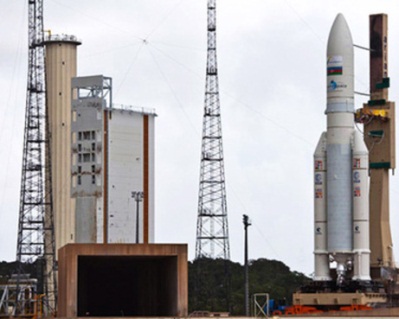Azerbaijan plans to launch another satellite in 2018

"The contract for Azerbaijan`s second satellite program is currently at the stage of signing," Nabiyev said.
According to him, Azerbaijan`s satellite program is primarily a commercial project. Prior to the launch of the first satellite, Azerspace-1, nearly 40 percent of its resources had been sold.
"We live in a highly competitive environment in the global and modern world," Nabiyev said. "ICT is the most advanced sector in Azerbaijan after the oil sector. Perhaps we will not be able to achieve our goals in a short period of time. Nevertheless, we should take a more creative and innovative approach and offer the right product on the market at the right time."
Work on a feasibility study of the project, coordination of orbital positions and acquiring a new orbital position is underway under the project on the launch of the second telecommunications satellite. The procurement procedures will follow later.
Commissioning of the first telecommunications satellite has contributed to providing high-speed Internet access across the country.
Launched on February 8 through Ariane 5 ECA rocket carrier owned by the French Arianespace company from the Guiana Space Centre, Azerspace-1 was on trials until March. The test operation period ended in April and since May the satellite started producing profit.
According to ICT Minister Ali Abbasov, so far Azerbaijan has earned some $5 million from operating Azerspace-1.
Satellite TV and radio broadcasts
Azerspace will also offer many advantages to the local TV and radio companies, as well as acceptable conditions for transmission. Special data compression technology will allow TV and radio companies to reduce usage of the satellite`s resources and arrange packet transmission of the highest quality.
The main indicator of quality will be the high level of signal transmission in the satellite`s coverage area.
In May, Azercosmos completed technical work on the allocation of resources of the first telecommunication satellite to local TV and radio broadcasters.
The agency said on June 3 that it has already signed contracts with local TV and radio broadcasting companies. Technical details are currently being hammered out.
The satellite will provide local television and radio broadcasters with many opportunities and good broadcasting conditions. Special compression technology will allow for a considerable reduction in these companies` usage of the satellite`s resources and provide the highest quality of broadcasts by enhancing the satellite`s signal.
Satellite dishes and receivers can be used for watching satellite TV. Frequencies to which users will be required to configure their dishes and receivers will be made public in the near future.
North African telecommunication operators started using resources of the satellite in May.
The satellite is controlled by the specialists of Azercosmos from Main Home Ground Satellite Control Center near the capital Baku. An alternative ground control center is located in Nakhchivan.
Some 20 percent of the satellite`s resources will be used for Azerbaijan`s needs, and 80 percent will be available for commercial purposes.
The satellite exploitation term in the orbit will be up to 15 years. The satellite`s services will cover Eastern Europe, the Caucasus, Central Asia and North Africa.
The satellite was designed to offer digital broadcasting services, Internet access, data transmission, to create multiservice VSAT networks and provide for governmental communication.
The total value of the Azerspace-1 project is about $230 million, including expenses on the construction of ground control stations, staff training, insurance costs and launching.
According to the Azercosmos expectations, the satellite will fetch $500-600 million to the country`s coffers in 15 years.














































